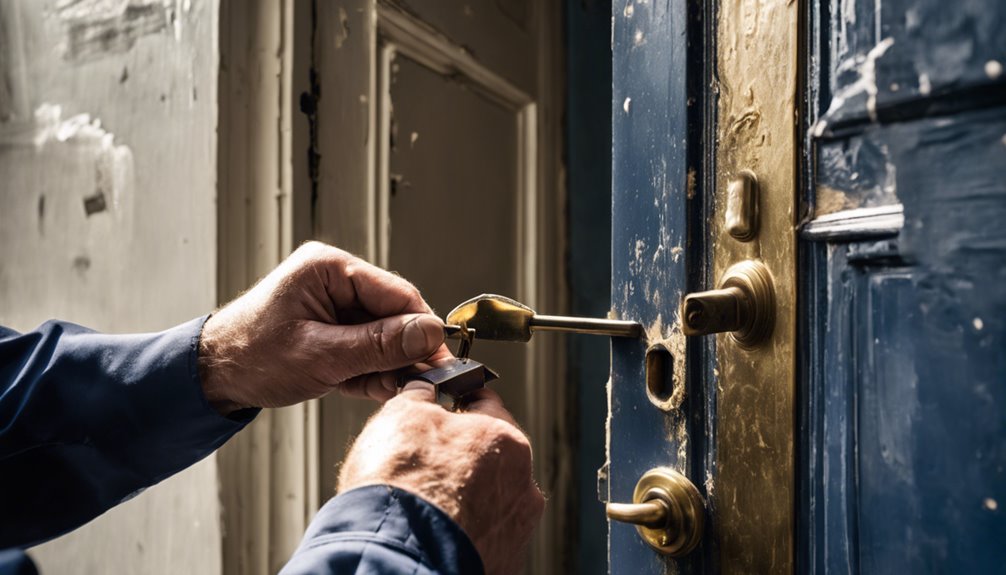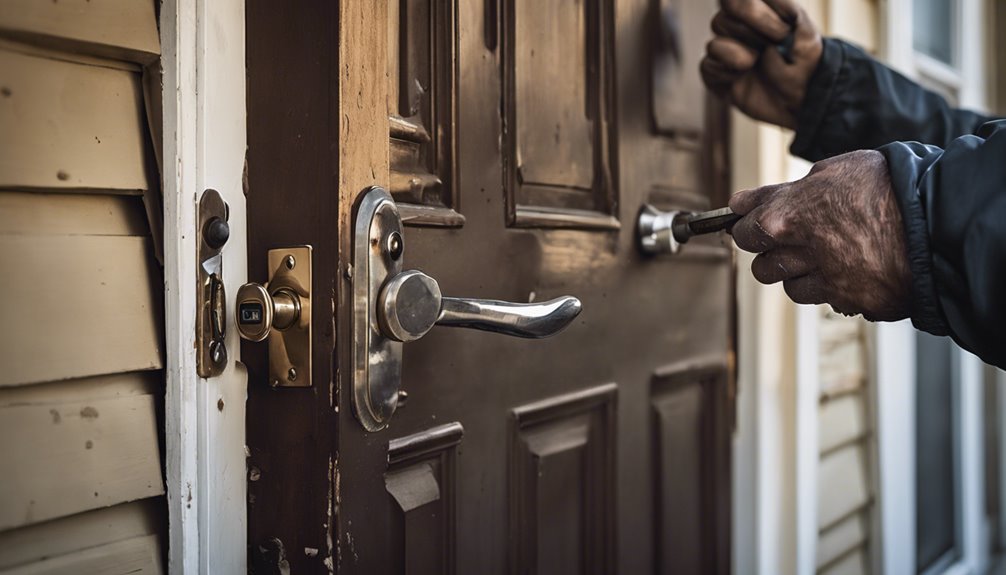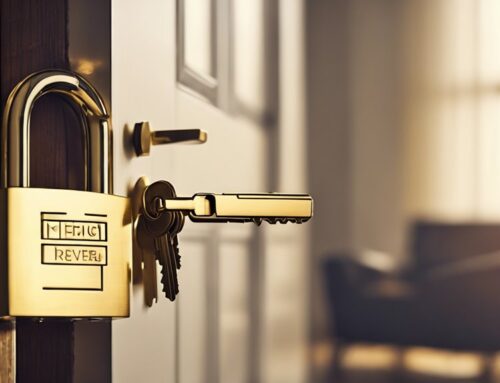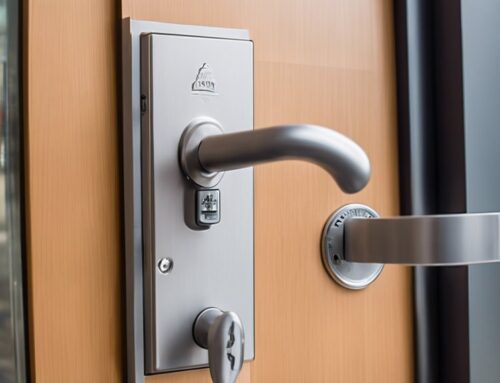Did you know that nearly 30% of eviction cases in New Jersey involve disputes over locks and access? As a property owner or landlord, understanding the crucial role locksmiths play in the eviction process can greatly impact your experience. These professionals don't just change locks; they guarantee compliance with state regulations while safeguarding your property. As you consider your options, it's vital to grasp how the right locksmith can influence your eviction's success and what to look for in a trusted partner. What happens if you overlook these factors?
Key Takeaways
- Locksmiths ensure compliance with New Jersey lock change laws during tenant evictions, mitigating legal risks for landlords.
- Proper documentation of lock changes by locksmiths serves as legal proof during eviction proceedings.
- They provide emergency lockout services, essential for landlords needing immediate access post-eviction.
- Locksmiths can rekey or install new locks to prevent evicted tenants from re-entering the property.
- Hiring certified locksmiths enhances property security and ensures adherence to lock safety standards during evictions.
Overview of New Jersey Eviction Laws

When managing eviction laws in New Jersey, it's imperative to understand the grounds for eviction and the notice requirements. Various legitimate reasons exist for evicting a tenant, including non-payment of rent, violations of lease terms, and illegal activities.
Disorderly conduct, like property damage or safety risks, also warrants eviction. Significant property damage can lead landlords to seek eviction, ensuring their property remains intact and safe. In New Jersey, landlords must adhere to specific laws when changing locks on a tenant's residence, especially during eviction proceedings, to ensure compliance with the state's lock change laws. It's also crucial for landlords to be aware of the laws governing key duplication to prevent unauthorized access to the property.
Notice requirements hinge on the situation. For non-payment of rent, a landlord must provide a 30-day notice if they've accepted late payments previously. Similarly, lease violations demand a 30-day written notice.
In cases of disorderly conduct and illegal activities, a much shorter, three-day eviction notice suffices. Month-to-month rental agreements require a 30-day notice from either party to terminate the arrangement.
Remember, landlords must have valid "just cause" for eviction. They've gotta document their claims, which include lease agreements, payment histories, and evidence of alleged violations. Additionally, landlords must adhere to specific legal notice requirements to avoid potential delays in the eviction process. This documentation is essential to build a strong case.
Tenants, on the flip side, can defend against eviction claims. Protections against retaliation and discrimination exist, and landlords must follow proper legal procedures.
Failure to adhere to the law means tenants can contest the eviction and remain on the property. Understanding these laws is fundamental in managing eviction processes effectively and ensuring a fair experience for all involved.
Legal Steps for Eviction

When facing eviction, you need to understand the legal grounds that justify your actions, whether it's due to non-payment or lease violations. Tenants can be evicted for failing to pay rent once or habitually. You'll also navigate the court filing process, which includes submitting necessary documents and attending hearings. In New Jersey, landlords have specific responsibilities regarding lock rekeying, which must be adhered to during the eviction process. Locksmiths must be aware of licensing requirements to ensure they operate legally and can provide services during eviction procedures. Finally, once a judgment is made, executing the warrant properly is essential to guarantee compliance with legal procedures.
Grounds for Eviction
Understanding the grounds for eviction is essential for landlords maneuvering the legal process. Knowing your options can help you take appropriate steps when dealing with tenants. Here are the primary grounds:
| Grounds for Eviction | Key Actions Required | Notice Period |
|---|---|---|
| Non-payment of Rent | Provide Rent Demand Notice | 5-business-day grace period |
| Lease Violations | Serve written notice of violations | 30-day notice to quit |
| Disorderly Conduct | Unconditional Notice to Quit | 3 days to vacate |
| Illegal Activities | Unconditional Notice to Quit | No cure period |
| End of Lease/Non-Renewal | Send 30-day notice to quit | 30 days after lease expiration |
Each of these grounds has specific requirements and timelines. Non-payment, for instance, allows the tenant a chance to "cure" the issue if they pay overdue amounts. On the other hand, violations and illegal activities can lead to immediate actions without the option to resolve. Familiarize yourself with these nuances to maintain your rights and guarantee a smooth eviction process when necessary. Furthermore, understanding the specific legal procedures involved in eviction ensures that landlords can act within the law and avoid potential lawsuits. Additionally, it's important for landlords to understand lock picking laws in New Jersey, as they may need to engage locksmiths legally during the eviction process. Engaging a certified technician can ensure that all lock-related tasks are handled professionally and within legal boundaries during the eviction.
Court Filing Process
Maneuvering the court filing process for eviction requires careful attention to detail and adherence to legal protocols to secure a successful outcome. First, you'll need to prepare a verified complaint, including the names, addresses, and prior notice detail for the tenant. Next, file your case in the special civil part of the New Jersey Superior Court, paying the applicable filing fees—$50 for claims up to $5,000 plus $5 for each additional tenant, or $75 for larger claims. In New Jersey, it's important to ensure your property's locks comply with lock safety standards to avoid potential legal challenges during the eviction process. Once filed, serve the tenant with a summons, which can be done by mail, in person, or posted on their property. Ascertain the tenant receives notice within the required timeframe to avoid complications.
Both parties must attend scheduled court proceedings; missing these could result in a default judgment for the tenant or dismissal for you as the landlord. Document your evidence meticulously, such as lease agreements and payment histories, to strengthen your case.
After a favorable judgment, you'll be required to wait three days before applying for an eviction order, ensuring all legal processes are correctly followed.
Locksmiths in New Jersey should also be aware of essential employment laws that govern their working conditions, wages, and rights, which may impact their role in eviction procedures.
Execution of Warrant
After obtaining a judgment for possession, you can take the next vital step: applying for a Warrant for Removal. This warrant allows you to proceed with the eviction process legally. You can apply for it three days after the court grants you possession.
Once issued, a special civil part officer will serve the warrant to the tenant, who then has three business days to vacate the property. If the tenant fails to comply, the officer will forcibly remove them.
Remember, tenants can escape eviction by paying the owed rent in full. However, if they seek a delay, they may request an Order for Orderly Removal for up to seven days or a hardship stay for up to six months, depending on their circumstances. Any such requests must be made through the court. High-security locks in New Jersey must adhere to specific state regulations to ensure compliance and protect property effectively.
It's important to note that self-help evictions are illegal. You can't change locks or remove belongings on your own. Only an authorized officer can carry out the eviction to avoid legal penalties.
For those in New Jersey, hiring a licensed locksmith ensures compliance with state regulations when rekeying or changing locks post-eviction, providing peace of mind and security.
Understanding these procedures guarantees you navigate the eviction process effectively and legally, maintaining your rights as a landlord while respecting the law.
Locksmiths' Essential Services

While maneuvering through the complexities of eviction procedures, locksmiths provide essential services that guarantee properties are secured and ready for new tenants. Their expertise guarantees that you can quickly and effectively deal with any issues arising during an eviction.
Here's a snapshot of the significant services they offer:
| Service | Description |
|---|---|
| Lock Installation and Rekeying | Change locks or rekey existing ones to prevent re-entry by the evicted tenant. |
| Compliance with Legal Requirements | Verify the eviction's legality and maintain proper records to avoid complications. |
| Emergency and Timely Services | Provide 24-hour service, completing lock changes in as little as 15 to 30 minutes. |
| Securing the Property | Install or change locks, including mailbox locks, to guarantee thorough security. |
| Documentation | Supply official records of all lock changes for legal purposes. |
By employing local locksmiths, you'll confirm that all actions comply with New Jersey laws while efficiently securing the property. Their prompt response minimizes disruptions, allowing landlords to maintain their schedule and protect their interests.
Locksmiths not only help avoid unauthorized access post-eviction but also enhance security measures, so you can confidently prepare for new tenants. Their role is pivotal in streamlining the process while safeguarding your rights and investments.
To ensure compliance with the Americans with Disabilities Act (ADA), businesses in New Jersey must install ADA-compliant locks that are accessible and usable by individuals with disabilities.
Preventing Property Damage

When managing an eviction, preventing property damage is key.
You can achieve this by using expert techniques like safe lock removal and specialized tools to minimize any potential harm.
Safe Lock Removal
To prevent property damage during lock removal, it's vital to adhere to legal protocols and assure proper execution. Before you even reach for the tools, confirm that you have verified the eviction notice and court order. This not only protects you legally but also guarantees that you're acting within your rights.
As a locksmith, you're responsible for changing the locks quickly and efficiently. Avoid causing unnecessary damage to the door or frame, which could lead to costly repairs. Your focus should be on changing locks on all exterior entrances and securing additional access points, like garages, as soon as possible. This helps prevent unauthorized access and protects the property from theft or vandalism.
Always conduct the lock change in the presence of the designated legal authority, such as the Sheriff. This step is fundamental to avoid legal repercussions and guarantees that all parties are protected during the process.
After the locks are changed, the property shifts to a secure space for any remaining belongings. Following these guidelines won't only secure the property but also uphold the integrity of the eviction process.
Expert Tool Usage
After effectively changing the locks, using the right tools becomes essential for guaranteeing smooth and damage-free eviction procedures.
You'll want to utilize specialized tools designed to gain entry without damaging locks or doors. Avoid lock-picking techniques that may risk damage and instead employ efficient methods to handle various lock types, including smart locks and high-security systems.
Equip yourself with advanced lock-picking tools, bolt cutters, and angle grinders for padlock removal. These tools enable you to perform tasks swiftly while preserving the integrity of the lock and door.
Key duplication equipment guarantees you have all necessary keys available, further expediting the process.
When replacing locks, verify they're installed properly to prevent the evicted tenant from regaining access. This may involve rekeying existing locks or installing new mailbox locks for future tenants.
If applicable, update master key systems to maintain security integrity.
Through this thorough approach, you not only comply with New Jersey's legal requirements but also support integrity during the eviction process.
Document every action you take, collaborating with law enforcement to follow all legal guidelines. This method assures a professional, damage-free experience for everyone involved.
Damage Minimization Techniques
Though you may be focused on the eviction process, preventing property damage is crucial for both legal compliance and maintaining the integrity of your investments.
Start with thorough tenant screening. Conduct background checks, verify income, and contact previous landlords to guarantee you select responsible tenants. A clear lease agreement is important. Outline maintenance responsibilities and include clauses about tenant negligence to set expectations and consequences for damages.
Regular property inspections allow you to identify potential issues early on. Document your findings and involve the tenant in the process to foster understanding.
Encourage open communication; this empowers tenants to report maintenance requests promptly, which helps avoid minor problems escalating into costly repairs.
Implement preventive measures, such as smoke detectors and security systems, to protect your property. Regular maintenance of appliances also minimizes future breakdowns, guaranteeing everything remains in good condition.
Collaboration With Law Enforcement

While maneuvering through the eviction process, collaboration with law enforcement becomes important for both landlords and tenants. If you're a tenant facing an illegal lockout, calling the police is critical. Officers will make certain that if the eviction isn't backed by a court order, you regain access to your home.
Remember, it's not just about getting back inside; police intervention can document the situation, which is significant for any potential legal action you might pursue.
Landlords, on the other hand, should be mindful of their actions. Engaging in self-help eviction methods can lead to being charged with a disorderly person's offense. It's important to follow legal procedures and make certain that all documentation regarding the eviction is in order.
If law enforcement gets involved and determines the eviction was illegal, they can intervene to uphold your rights as a tenant.
Both parties should document all interactions during this process, including communications and any notices served. Bodycam footage or police reports can serve as valuable evidence if disputes arise later.
Landlords who ignore legal processes may face fines or civil suits, along with potential penalties from the Anti-Eviction Act.
Importance of Professional Expertise

When maneuvering the eviction process, having a skilled locksmith on your side can make all the difference. Their professional expertise guarantees that everything runs smoothly, allowing you to focus on reclaiming your property with minimal stress.
| Key Benefits | Details |
|---|---|
| Expertise and Skillset | Efficiently access or rekey complex locking systems. |
| Immediate Response | Fast, reliable service to address urgent lock issues. |
| Legal Compliance | Knowledge of laws to prevent legal complications. |
A locksmith provides essential support by responding quickly to your calls, verifying that evictions unfold according to legal guidelines. Their familiarity with different types of locks means they can handle unexpected lock changes, allowing for a more seamless shift between tenants.
Additionally, experienced locksmiths know how to work without causing unnecessary damage. This skill not only saves you from added repair costs but also helps maintain the integrity of your property. They can recommend high-grade security systems and conduct assessments to fortify your property against future issues.
Moreover, a professional locksmith understands the legal landscape surrounding evictions. This guarantees that every step you take aligns with regulations, safeguarding your rights as a landlord while respecting the tenant's dignity. By engaging a knowledgeable locksmith, you're investing in a straightforward eviction process, ultimately gaining peace of mind and control over your property.
Cost Considerations for Locksmith Services

Understanding the costs associated with locksmith services is essential for landlords maneuvering the eviction process. You'll find that the initial service call typically starts at around $15, covering the technician's time, gas, and an assessment of your situation. This fee also includes a security consultation, which is valuable as you evaluate the locks involved.
If you face a lockout, expect residential services to cost between $35 and $39, while commercial services begin at $69. For changing locks, residential options start at $49 and commercial at $69, though prices may rise depending on the security level of the locks you choose.
For specialized services, re-keying locks comes in at $19 for residential and $29 for commercial properties. Installation can range from $40 to $100, plus labor charges, which generally hover between $15 and $40. If locks need to be drilled for installation, anticipate starting costs at $60 based on door type.
Keep in mind that night, holiday, and weekend services can range from $100 to $250, which can impact your budget considerably. Emergency services, available around the clock, vary in cost depending on the time and complexity of the job.
Customized key duplication is an affordable option, spanning from $3 to $20, but note that extra tasks like drilling may incur additional fees. By being aware of these costs, you can better plan your expenses during the eviction process.
Choosing the Right Eviction Locksmith

How do you guarantee you're choosing the right locksmith for an eviction? Start by ensuring the locksmith is licensed and insured specifically for eviction cases. This protects you and guarantees they adhere to legal requirements.
Look for locksmiths who've specialized training and experience dealing with evictions. Their knowledge of local laws will help make the process smoother and more credible.
Availability is essential in emergencies. Opt for locksmiths who provide 24/7 services and can respond quickly to any urgent situations. You'll want a partner who respects your schedule and arrives on time, minimizing disruption during the eviction.
Evaluate the services offered by the locksmith. They should be able to change or rekey locks efficiently, install new locks, and handle high-security systems if needed. If your property is commercial, consider locksmiths experienced in master key systems.
Professionalism matters. Choose locksmiths who communicate clearly, so you understand every step of the process. They should respect your privacy, handle everything discreetly, and possess problem-solving skills for unforeseen challenges.
Finally, look for customer reviews and recommendations. Positive feedback from other property owners will guide you in making your decision.
Frequently Asked Questions
What Is the Timeline for the Eviction Process in New Jersey?
In New Jersey, the eviction process typically spans several weeks to a few months.
You'll begin with a notice period, which varies based on the reason for eviction, often requiring a few days to 30 days.
After filing an eviction lawsuit, expect a hearing within 10 to 30 days.
If the court rules in your favor, a Warrant for Removal can be issued after three business days, giving the tenant a short time to vacate.
Can Tenants Contest an Eviction in Court?
You've got the right to contest an eviction in court—it's not a walk in the park, but it's your chance to defend your home!
Even if your landlord has a good reason, you can present evidence to support your case.
Attend the hearing, and don't miss it; otherwise, a judgment could be handed down against you.
This is your opportunity to fight for your rights and seek a fair outcome.
What Should Landlords Do if a Tenant Refuses to Leave?
If a tenant refuses to leave, you can't resort to self-help methods.
Instead, you must secure a Judgment for Possession from the court. After obtaining this judgment, a Warrant for Removal is issued, which allows an authorized official to carry out the eviction.
Make certain to give the tenant notice, providing them a chance to vacate voluntarily.
Always follow legal procedures to avoid complications and potential legal repercussions.
Are There Resources for Tenants Facing Eviction?
Facing eviction feels like a bad episode of a reality show—you gotta know your options!
You've got resources like Volunteer Lawyers for Justice, which offers free legal assistance. Check if you qualify for their services.
Don't ignore your rights; you're entitled to a trial, and proper notice must be given before eviction.
Contact local legal aid for support, and remember, understanding your rights is key to fighting back against this challenge!
How Can Landlords Ensure Compliance With Eviction Laws?
To guarantee compliance with eviction laws, you should first register your property with the municipality and keep it updated.
Serve the appropriate notices based on the situation, making sure to follow local regulations.
When filing eviction complaints, submit them to the correct court in your property's county.
Finally, always obtain a court order before initiating an eviction, and use professional services to handle any lock changes legally and responsibly.
Conclusion
In maneuvering eviction procedures in New Jersey, partnering with a certified locksmith is essential for landlords. Imagine a scenario where a landlord, after a challenging eviction, finds comfort knowing their property is secure, thanks to a professional's expertise. With the locksmith's help, they can reclaim their space without worry. By ensuring compliance and protecting their investment, landlords can focus on moving forward rather than looking back at a difficult situation. Choose wisely to secure peace of mind.









